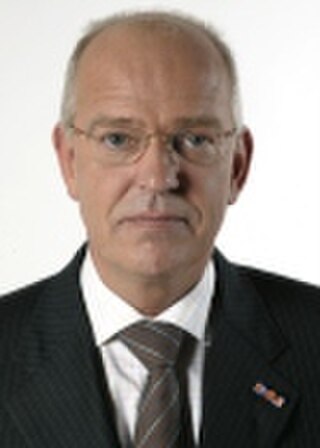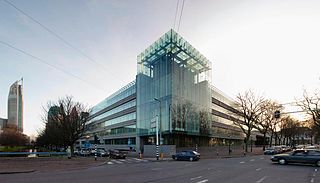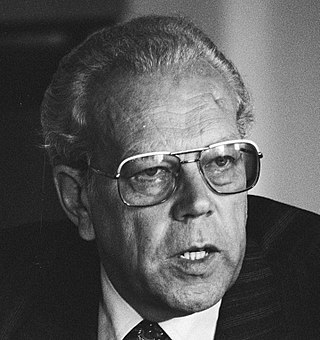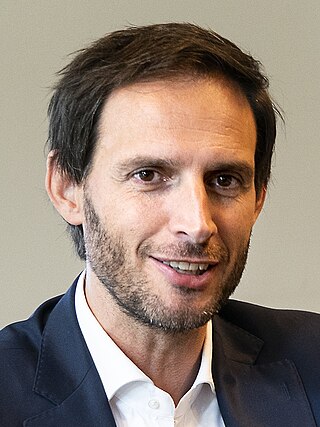
The foreign policy of the Netherlands is based on four basic commitments: to the Atlantic cooperation, to European integration, to international development and to international law. While historically the Kingdom of the Netherlands was a neutral state, since 1945 it has become a member of NATO, the United Nations, the European Union and many other international organizations. The Dutch economy is very open and relies on international trade. During and after the 17th century—its Golden Age—the Dutch built up a commercial and colonial empire. It was a leading shipping and naval power and was often at war with England, its main rival. Its main colonial holding was Indonesia, which fought for and achieved independence after 1945. The historical ties inherited from its colonial past still influence the foreign relations of the Netherlands. Foreign trade policy is handled by the European Union. The Dutch have been active in international peacekeeping roles.

Gerrit Zalm is a retired Dutch politician of the People's Party for Freedom and Democracy (VVD) and businessman.

The Ministry of Health, Welfare and Sport is the Dutch Ministry responsible for public health, health care, quality of life, social work and sport. The Ministry was created in 1951 as the "Ministry of Social Affairs and Health" and had several name changes before it became the "Ministry of Health, Welfare and Sport" in 1994. The Ministry is headed by the Minister of Health, Welfare and Sport, currently Ernst Kuipers (D66), assisted by one State secretary, currently Maarten van Ooijen (CU).

The Ministry of Education, Culture and Science is the Dutch Ministry responsible for education, culture, science, research, gender equality and communications. The Ministry was created in 1918 as the Ministry of Education, Arts and Sciences and had several name changes before it became the Education, Culture and Science in 1994. The Ministry is headed by the Minister of Education, Culture and Science, currently Robbert Dijkgraaf

The Netherlands Institute of International Relations Clingendael or Clingendael Institute is a Dutch think tank and academy on international relations. Based in Wassenaar on the municipal border with The Hague, the institute also publishes Clingendael Magazine 'Spectator', an online monthly on international politics. As of 2012, the institute is organised into two departments: Clingendael Research and Clingendael Academy.
Jorien van den Herik is a Dutch businessman. He is most widely known as the former chairman of Dutch football club Feyenoord Rotterdam between 1992 and 2006.
A fraud squad is a police department which investigates fraud and other economic crimes, the largest of which in the United Kingdom is run by the City of London Police

The Ministry of Foreign Affairs is the Netherlands' ministry responsible for foreign relations, foreign policy, international development, international trade, diaspora and matters dealing with the European Union, NATO and the Benelux Union. The ministry was created in 1798, as the Department of Foreign Affairs of the Batavian Republic. In 1876, it became the Ministry of Foreign Affairs.

The Ministry of Finance is the Dutch Ministry responsible for economic policy, monetary policy, fiscal policy, tax policy, incomes policy, financial regulation, the government budget and the financial market. The Ministry was created in 1798 as the Department of Finance of the Batavian Republic. It became the Ministry of Finance in 1876. The Minister of Finance is the head of the Ministry and a member of the Cabinet of the Netherlands. The current Minister is Sigrid Kaag.

The Tax and Customs Administration is the tax collection and customs service of the Kingdom of the Netherlands. It is part of the Ministry of Finance and is responsible for levying and collecting taxes in the Netherlands.
Netherlands benefits from a strategic geographic location, a world-class economy, a stable political climate, and a skilled workforce. The Netherlands has a large network of tax treaties, a low corporate income tax rate and a full participation exemption for capital gains and profits. These characteristics, in addition to a favorable tax environment, make Netherlands one of the most open economies in the world for multinational corporations (MNCs).
Standard Business Reporting is a group of international programs instigated by a number of governments to reduce the regulatory burden for business. The concept is to make business the centre when it comes to managing business-to-government reporting obligations.* Businesses conduct their own financial administration; the facts they record and decisions they make should drive their reporting. The government should be able to receive and process this information without imposing undue constraints on how businesses administer their finances.

Willem "Wil" Albeda was a Dutch politician of the defunct Anti-Revolutionary Party (ARP) and later of the Christian Democratic Appeal (CDA) party and economist.

The Ministry of Finance is an Indonesian government ministry responsible for the nation's finance and state assets. The Finance Minister is responsible to the President. The ministry's motto is Nagara Dana Rakça, which means "guardian of state finance".

Wopke Bastiaan Hoekstra is a Dutch politician who has served as second Deputy Prime Minister of the Netherlands and Minister of Foreign Affairs in the fourth Rutte cabinet since 10 January 2022. He has also been Leader of the Christian Democratic Appeal (CDA) since 2020. Hoekstra previously served as Minister of Finance in the third Rutte cabinet from 2017 to 2022.

Diplomatic relations exist between Azerbaijan and the Netherlands.

Menno Snel is a Dutch politician. A member of the Democrats 66 (D66) party, he served as State Secretary for Finance from 26 October 2017 until his resignation on 18 December 2019.

The Netherlands Maritime Special Operations Forces is the special forces unit of the Marine Corps of the Royal Netherlands Navy. It is one of the three principal units tasked with special operations in the Netherlands. The unit can be deployed worldwide to conduct special operations, including counter-terrorism both overseas and domestically, with a maritime focus. Its operations are planned and coordinated by the Netherlands Special Operations Command, as are the operations of the KCT.
In the Netherlands the Treasurer-General is the head of the General Treasury, part of the Ministry of Finance. The holder of the office has a deputy and is a member of the board of directors of the finance ministry.

The Dutch childcare benefits scandal is a political scandal in the Netherlands concerning false allegations of fraud made by the Tax and Customs Administration while attempting to regulate the distribution of childcare benefits. Between 2005 and 2019, authorities wrongly accused an estimated 26,000 parents of making fraudulent benefit claims, requiring them to pay back the allowances they had received in their entirety. In many cases, this sum amounted to tens of thousands of euros, driving families into severe financial hardship.















